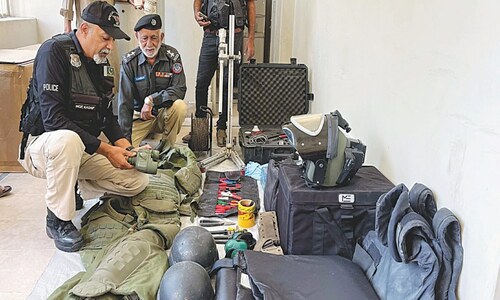KARACHI, Nov 20: The city police have lost more than 100 of their men so far this year, making 2012 the deadliest year in a decade for the city police. The victims ranked from constable to superintendent, it emerged on Tuesday.
The authorities and critics agree that the level of threat faced by policemen has grown multiple times that, on the one hand, makes the policing in Karachi more challenging than any other part of the country and, on the other, questions the standards of training and resources being offered to the personnel to serve in the ‘most difficult phase of the city police history’.
“Two policemen were found shot dead just last week,” said a source citing the data of the policemen killed since 2000. “Their bodies were found in an area along the Superhighway. Apparently they were kidnapped, tortured and finally shot in the heads. Their deaths brought the number of Karachi policemen killed in 2012 to 102.”
Since 2000, he said, 386 officials of the city police had been killed, mostly in firing in several parts of Karachi. He, however, said the policemen killings made an unprecedented jump in 2011 and the figures crossed the 100 mark in 2012.
“In 2000 seven policemen were killed. Similarly, in 2001, nine policemen met the same fate. No policeman was reported killed in 2002. Three policemen were killed in 2003, 22 in 2004, 12 in 2005, 40 in 2006, 14 in 2007, 35 in 2008, 31 in 2009, 24 in 2010, 87 in 2011 and 102 so far have been assassinated this year,” said the source.
The data also echoed in a statement of interior minister Rahman Malik, who told the senate the other day that in Karachi a total of 2,339 police encounters were reported in 2012, in which 145 armed bandits were also killed. The city police chief seconded the interior minister’s views and said that ‘policing in Karachi means facing several threats simultaneously’.
“The Karachi police, I believe, are in the most dangerous phase of their history,” said additional IG Sindh police Iqbal Mahmood. “There are three major reasons behind this year’s killing of policemen, the highest number in a year during the decade. Some policemen were murdered for their own reasons or personal enmity, but that ratio is too small.”
Explaining the reasons, he said, the first was the number of armed encounters in which policemen battled mostly with street criminals and bandits. Second, the policeman had been greatly challenged in district west, where armed gangs of different groups posed threat to the city police.
“And finally the police move against drug rackets which in reaction killed policemen. There are also attacks on policemen associated with the investigation arms of the department simply because of their proactive approach to suspects or criminal groups,” he added.
“Policing in Karachi has become the riskiest job. We need to handle multiple threats at a time. Crime or violence on political grounds or threat from militants; these days a policeman needs to take care of all these issues,” said the AIG.
Experts recognise the threat policemen are facing but wonder over the institution, which hardly cares for the loss of its ‘primary and national asset’ and despite frequent killings of law-enforcers, no alarms bells rang in the Sindh police hierarchy.
“As an institution, I believe, there is no resolve in the city police,” said Jameel Yousuf, who remained in close contact with the city police from 1996 to 2003 as the chief of the Citizen-Police Liaison Committee. “Attacking an officer or policeman means a lot for an institution. It should be taken as an attack on the institution, but I hardly witness that there is a level of concern reflecting from the police hierarchy on the issue.”
The killing of more than 100 policemen in less than a year should lead to a decisive action by the authorities, but unfortunately the police institution was powerless for that initiative, he added.
“I wonder the way police authorities pursue the cases of their men’s killing. You may see advertisement offering rewards for different tasks from the police, but they never took that initiative for the arrest or assistance in the arrest of their men’s killers,” he said.
“There is no doubt that the police are threatened more than ever. Here, I remember the same dilemma faced by the Mumbai police some years ago, when the authorities there launched a massive crackdown against the criminals, which proved a morale booster for their own men, and demoralised the criminal gangs,” added Mr Yousuf.













































Dear visitor, the comments section is undergoing an overhaul and will return soon.